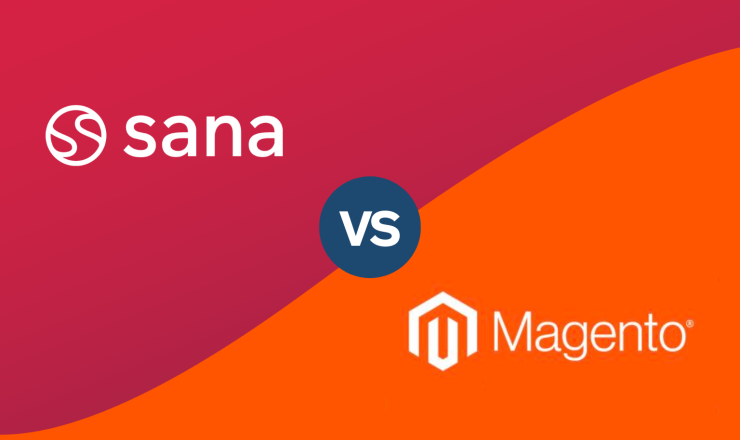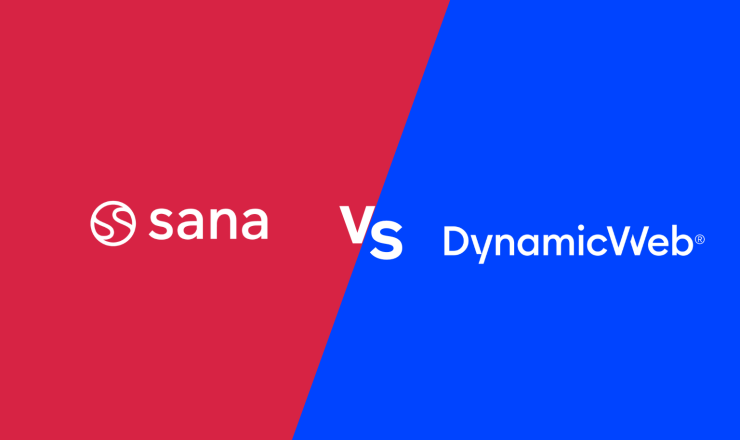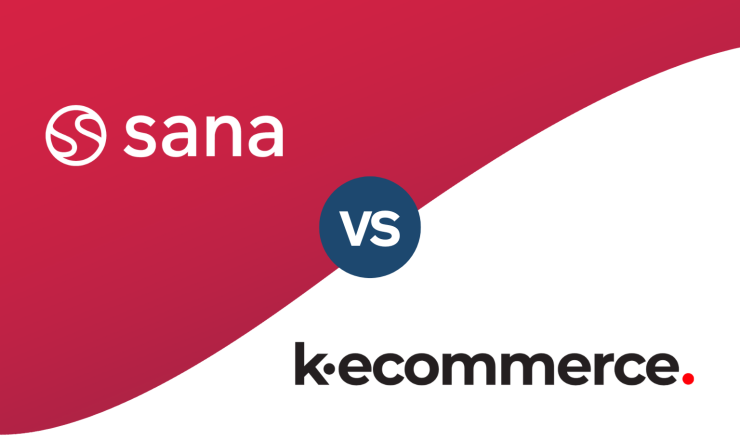

Finding the right B2B e-commerce platform for your business can be complex and challenging – there are so many solutions available that offer similar functionalities.
In this article, you’ll learn the ins and outs of BigCommerce and Sana Commerce Cloud, like supported ERPs and main functionalities of each, so you can figure out which B2B e-commerce solution best fits your business’ requirements. By the end, you will know the key differences between BigCommerce vs. Sana Commerce and in which cases one might be right for you over the other (and vice versa).
Overview Sana Commerce Cloud vs. BigCommerce
Sana Commerce Cloud and BigCommerce are both cloud-based e-commerce platform providers.
Sana Commerce Cloud is the only B2B e-commerce solution built into the ERP, leveraging its power to provide accurate and reliable data, in real-time. The native ERP integration of Sana Commerce Cloud centralizes all business data and creates a single source of truth, meaning you only need to maintain one set of business data.
Undoubtedly, most people looking for an e-commerce solution will have also heard of BigCommerce. BigCommerce is also a cloud-based e-commerce platform that enables businesses to create and manage online stores through a set of tools, features, and add-ons, and is widely adopted by B2C retailers.
As both platforms cater to both B2B as well as B2C experiences, let’s dive deeper into what differentiates both e-commerce platform providers.
What is Sana Commerce Cloud?
The e-commerce platform Sana Commerce Cloud is built with your ERP system as its foundation – an approach that’s unheard of in e-commerce.
Most e-commerce platforms are built with the web store as the starting point. E-commerce platforms are traditionally stand-alone sites, that do not directly integrate with the ERP. They require a third-party connector to connect the ERP with the e-commerce platform.
Sana Commerce Cloud is different: the cloud-based e-commerce platform relies on the ERP integration. This allows Sana’s customers to bring their offline relationships with their buyers online. Making the ERP and e-commerce work as one eliminates system silos, unnecessary complexities and compromises caused by mainstream e-commerce solutions.
The ERP serving as the single source of truth enables customers to get the best out of their ERP investment. They can therefore benefit from seamless integration with a web store that’s powered by their ERP.
What is BigCommerce?
BigCommerce doesn’t offer native pre-built ERP integration with Microsoft and SAP ERP’s. Like most other e-commerce providers, BigCommerce was built as a stand-alone system. This means pricing, product, and customer data lives and needs to be maintained within the platform itself to the webstore via pre-built integrations.
However, these integrations are maintained by the ERP partner, not by BigCommerce. For companies who maintain their ERP as their single source of truth, it is possible to integrate BigCommerce using 3rd party ERP connectors, but these often fall short in their capabilities.
BigCommerce is an e-commerce platform for growing and established online businesses that want a solution in a user-friendly package, according to many reviews on G2’s software comparison website. It is often quoted as being a great platform for small or starting businesses that want to start developing their e-commerce. However, it’s likely not going to be the same low-cost solution you want to continue with to scale your business for the long run.
Most functionalities are possible with extensive built-in tools, apps, and add-ons that BigCommerce leverages for its main operations. Whereas Sana Commerce Cloud truly integrates with the ERP to power the webstore
Key differences between BigCommerce vs. Sana Commerce
Sana Commerce and BigCommerce are both categorized as e-commerce platform providers with SaaS business models, meaning they are hosted in the cloud, on servers maintained by the e-commerce providers themselves. However, they both play very distinct roles in e-commerce in terms of scope, security and compliance, and features.
1. Audience and Scope
With regard to scope, BigCommerce is known for its offer to companies desiring speed to market (especially those selling direct to consumers) and midsize organizations requiring both B2B and B2C functionality on the same platform.
BigCommerce has obtained some large customers, only a small number achieve annual GMV of over $50 million. Although they’ve long since shifted their focus to both B2C and B2B or ‘enterprise’, it remains unclear what BigCommerce defines as ‘enterprise’.
Sana Commerce, in contrast, provides a platform that focuses on B2B wholesalers, distributors, and industries, enabling us to truly cater to the unique needs of each industry. Both small to medium-sized businesses and enterprises have different needs. At Sana Commerce, we understand this and therefore specialize in e-commerce for the B2B market.
B2B products tend to be more complex, are ordered in larger quantities with customer-specific agreements with suppliers. Sana Commerce Cloud was born out of an understanding of this complexity, and integrates with the ERP to effortlessly meet all your customers’ web store requirements.
2. Security and Compliance
It’s worth noting that both e-commerce platforms are certified for ISO/IEC 27001:2013 and PCI DSS, which is a significant achievement. This represents that a lot of work has been put into ensuring the security of your data. The platforms maintain maximum security and minimal risk, along with safe business practices.
However, there is a difference between security and compliance. The number of cyber threats and attacks have skyrocketed over the years along with the rapid advancement of technology. Indisputably, your platform must be secure and compliant when dealing with substantial amounts of sensitive data in the B2B e-commerce game.
To ensure security is maintained on an individual user level, Sana Commerce offers single sign-on (SSO) – a form of user authentication which ensures only authenticated users are able to access to the back-end. This functionality is included out-of-the-box where BigCommerce does
In addition, Sana proudly offers hosting on Microsoft Azure – one of the most secure and reliable hosting systems in the world. With Microsoft Azure, data is protected in the data center closest to the ERP environment and stored via an encrypted storage service.
In a nutshell, your data is highly secure and safe with SaaS deployed ERP-integrated e-commerce platform through:
- Automatic upgrades – new features, performance optimizations and add-ons on a regular basis help keep up with changes in the e-commerce industry.
- Maintaining the latest security fixes – Your installation will always be up to date and protected against vulnerabilities like downtime, data loss, and hacks.
- Single-tenant environment – A single instance of the application is dedicated to each Sana customer or “tenant” meaning databases and storage accounts are separate per customer.
BigCommerce deployments are hosted in multi-tenant environments. A major downside to multi-tenant architecture is its vulnerability. A multi-tenant environment allows multiple access points for users, reducing control of security and potentially increasing the threat of a security breach.
Sana Commerce demonstrates to customers, partners, and stakeholders alike, that they take information security seriously and take all steps to protect sensitive data and has put measures in place to protect information and data from unauthorized access, theft, or damage.
3. Features and Reliability
Though both Sana Commerce Cloud and BigCommerce are cloud-based e-commerce platform providers, Sana Commerce Cloud is built into the ERP while BigCommerce is app-focused and relies on third-party or partner integrations to achieve ERP-integration for common functionalities.
- Native B2B functionality – By lacking native B2B functionalities, BigCommerce has missing functionalities such as that B2B e-commerce ERP integration can provide. Additionally, Sana Online Help details possibilities of implementing spending limits and budgets per role.
- Application ecosystem – BigCommerce has many application ecosystem partners and at least one native integration for most types of relevant applications. Additionally, many BigCommerce partners have created their own adapters, so BigCommerce clients have many options to choose from, that may be more B2C-focused. The app and add-on ecosystem of Sana Commerce Cloud, on the other hand, has been developed specifically for the B2B market.
- Flexibility – BigCommerce offers a cloud-native platform with GraphQL and RESTAPIs and a modular architecture. Its modern architecture is headless and fully decoupled from the storefront. Commerce functionality is available via APIs, with a few exceptions related to security.

Want to change the way you do B2B e-commerce?
When to choose BigCommerce
Native ERP integration with Dynamics and SAP is one of the key factors that drives the success of Sana Commerce Cloud. BigCommerce, conversely, offers integrates with a wider group of ERPs like Oracle, NetSuite, and Acumatica. These pre-built integrations with Acumatica and NetSuite are built and maintained by the ERP provider themselves, not by BigCommerce.
BigCommerce also offers integration with Microsoft Dynamics or SAP, but they’re not native integrations. They offer stand-alone connectors via the BigCommerce marketplace for Dynamics AX/365 and SAP B1 but these are maintained through third-party companies like e-bridge, for example.
Why does this matter?
Let’s say there is a sync issue between your BigCommerce store and your ERP. For example, stock updates are not being pushed to your e-commerce platform. It becomes much more difficult to diagnose what piece of software is causing the issue as there are multiple stakeholders involved. To find the root cause, the web store admins would need to call three separate support teams: BigCommerce, the third party who maintains the connector, and the ERP partner.
It all boils down to which option is more convenient and relevant for your business needs and goals. Whether it be integrating with an ERP to save time in a shorter term, or choosing a natively integrated platform that will save headaches and time in the long run for a greater return on your investment.
When to choose Sana Commerce Cloud
We believe the native ERP integration of Sana Commerce Cloud can provide you with a competitive advantage in the following situations:
- You want to focus on B2B capabilities. Sana provides you with the ability to create and modify B2B workflows and by understanding B2B capabilities, incorporates ordering larger quantities of products, accounts for customer-specific agreements with suppliers, and customized pricing arrangements.
- You want no-fuss. The developers at Sana Commerce are subject matter experts in e-commerce for SAP and Dynamics ERPs, with over 20 years’ experience successfully implementing ERP-integrated e-commerce platforms. Cloud-based, no downtime, completely seamless synchronization. What more could you ask for?
- You don’t want too much reliance on third parties. Sana has complete ownership and control. We can deploy the entire solution ourselves, which contributes to more control on time and quality of the implementation.
- You’d like to see in-depth reporting. Analysts reports and G2 reviews indicate that BigCommerce reporting functionality is limited whereas Sana Commerce Insights (SCI) is explicitly mentioned as a distinguishing strength of SCC.
- You’re running on one of the following ERPs: Dynamics 365/AX/NAV/GP or SAP ECC/B1 or S/4HANA.
Why ERP integration is the foundation of Sana Commerce Cloud
ERP integration is the foundation of Sana Commerce Cloud. Our goal isn’t to rebuild the functions that the ERP already has, but to create a platform on top of the ERP. This allows our customers to maximize their investment in their ERP, whether it be Microsoft Dynamics or SAP.
With Sana Commerce Cloud, it isn’t even possible to create products solely within the platform. We believe there is no need to duplicate work, so if the functionality is covered by the ERP, there’s no need to replicate it in the e-commerce platform. Duplicate content creates the opportunity for error and thus decreases the efficiency and profitability of your business. Your ERP should serve as your single source of truth.
How does Sana Commerce Cloud integrate with your ERP?
Sana Commerce Cloud and your ERP work as one. The database and every interaction that has been created in the ERP is automatically reflected in your web store. This accounts for all customer and order data, pricing tables and product information, as well as intricate pricing setups, workflows, trade agreements, stock rules and more.
How do you benefit from native ERP integration in e-commerce?
- Native integration makes it easy to set up Sana Commerce Cloud with your Dynamics or SAP ERP.
- Ongoing maintenance costs and resources are reduced.
- Setup takes place in the cloud and allows regular system updates to happen automatically with no downtime.
- The only database you need to maintain for your e-commerce is your ERP.
This saves you time and effort on complex data synchronization, along with numerous other benefits that B2B e-commerce ERP integration can provide your organization. When your ERP and e-commerce work as one, you eliminate siloed data and instead get one unified system that’s powered by your ERP.
Final thoughts on BigCommerce vs. Sana Commerce Cloud
Sana Commerce Cloud fully integrates with your ERP system, pulling real-time data directly from your ERP. The solution is highly personalized to B2B and the integration can help automate pricing, inventory, and order management, and provide a seamless experience for customers.
BigCommerce also provides integrations with more ERPs, is cloud-based, and enables businesses to create and manage their online store in a user-friendly package. Functionalities are possible through leveraging built-in tools and add-ons through third parties. That’s where Sana Commerce and BigCommerce differ in terms of philosophy.
We know that replatforming your B2B web store is a great investment of time and resources, that’s why we’re here to support you every step of the way to ensure your business’ success. Sana Commerce excels in its specialization of understanding B2B needs, requirements, and the important role your Microsoft Dynamics or SAP ERP plays.

Thinking of replatforming?
Get our free replatforming guide or speak with one of our e-commerce experts.



